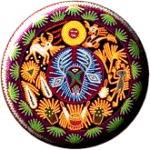|
SHAMANISM
Shaman are spiritual beings
with the ability to heal, work with
energies and 'see' visions. The
essential characteristics of shaman are
mastery of energy and fire as a medium
of transformation. Shamanism is a
range of traditional beliefs and practices that involve the
ability to diagnose, cure, and sometimes cause human
suffering by traversing the axis mundi and forming a
special relationship with, or gaining control over, spirits.
Shamans have been credited with the ability to control the
weather, divination, the interpretation of dreams, astral
projection, and traveling to upper and lower worlds.
Shamanistic traditions have existed throughout the world
since prehistoric times.
This broad term includes the thousands of tribal faiths
which have existed on every continent since long before
recorded history. Beliefs include a deep sense of the
sacredness of life and of the earth, communion with spirit
guides and in the ability of man to live in harmony with and
influence nature. |

WORLD RELIGIONS
COMPARED
WORLD
RELIGIONS CLIPART
WORLD
RELIGIONS HOME
SHAMAN HISTORY |
Shamanism is understood by Russian scientists to be a
primitive form of religion or religio-magic practiced
by the aborigines of northern Asia as well as by all other
aborigines throughout the world. Others hold that Shamanism
was only one form of expression of the religious cult of
northern Asia, practiced in order to avert the evil spirits.
This opinion is found in the writings of Jochelson
and Bogoras.
Shamanism is based on the premise that the visible
world is pervaded by invisible forces or spirits that affect the
lives of the living. In contrast to animism and animatism,
which any and usually all members of a society practice, shamanism
requires specialized knowledge or abilities. Shamans are not,
however, organized into full-time ritual or spiritual associations,
as are priests.
The word shaman originated among the Siberian
Tungus (Evenks) and literally means he (or she). It has
replaced the older English language term witch doctor, a term
which unites the two stereotypical functions of the shaman:
knowledge of magical and other lore, and the ability to cure a
person and mend a situation. However, at the present time this term
is generally considered to be anthropologically inaccurate.
Medicine man is preferred, especially as not all traditional
peoples approve of the use of shaman as a generic term, given that
the word comes from a specific place and people.
Our ancestors the emperors
of old governed the realm by first paying
worship to the kami with reverence and awe. Widely worshipping the
kami
of mountain and river, they thereby had natural concourse with
heaven and
earth. For this reason, summer and winter also turned in their
season,
and the works of creation were in harmony.
Nihon Shoki
